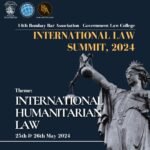State of Bombay and Ors. v. F.N. Balsara:- Case Analysis
In the Supreme Court of India Case: State of Bombay and Others v. F.N.Balsara Citation: AIR1951 SC318, 1951(53)BOML982, (1951)IIMLJ141, [1951]2SCR682 Appellants: State of Bombay and Others Respondent: Fram Nuservanjee Balsara (F.N.Balsara) Bench: Saiyid, Fazl Ali, M. Patanjali, Sastri, B.K.Mukherjea, Sudhi Ranjan Das and Vivian Bose, JJ. Date of Judgement: 25 May, 1951
INTRODUCTION
The case highlights to the provisions of constitutional law. The case applied the doctrine of pith and substance which helps to concern the true character and nature of legislation. The petitioner pleaded the Bombay Prohibition Act was violative of Article 19(1)(g) of the Indian Constitution. Thus, it must be declared void.
FACTS
Subject
In this case it has been considered as to whether under the Prohibition Act, the keeping of alcohol mixed medicine and toilet good their selling and buying and using can be prohibited or not.
Background
F.N. Balsara, stated that he should be given assent to use his right to keep Whisky, Brandy, Wine, Beer, with medicine U.D.Colon etc. He further stated to use them and import-export them within the Custom Limits. Also, that government must not obstruct him from such usage under Prohibition Act as it was his personal right and to pass the similar orders under the Specific Relief Act.
Balsara, showed himself the citizen of India and presented a petition in the Bombay High Court. He requested for passing an order to forbid the State and Prohibition Commissioner from enforcing the provision of Bombay Prohibition Act, 1949 against him. He also requested to pass an order to that effect.
ISSUES (High Court)
- Whether the provisions of Bombay Prohibition Act are valid or not?
The petitioner filed a writ of mandamus of an order under Section 45 of Specific Relief Act.
Judgement
The Hon’ble High Court agreed with the petitioner’s allegation and not agreeing with some others, declared that some provisions of the Act are valid while some are invalid.
Aggrieved, with the permission of High Court went to the Hon’ble Supreme Court. Both the State Government and Balsara filed an appeal in the Supreme Court, against the decision.
ISSUES (Supreme Court)
- Whether there are sufficient grounds for declaring the whole Act to be invalid?
- Whether the judgement of Bombay High Court be upheld with regard to the specific provisions of the Act?
GUIDING CASES
The Court relied upon the guidance of Supreme Court of America through the following cases-
Selzman v. United State[1]
Section 4, National Prohibition Act, which forbade the sale of denatured alcohol for beverage purposes or under circumstances from which the seller may reasonably infer the intention of the purchaser to use it as a beverage was challenged. It was challenged on the ground that the 18th Amendment does not give to the Congress authority to prevent or regulate the sale of denatured alcohol which is not a beverage although intoxicating
Purity Extract & Co. v. Lynch[2]
In this case the plaintiffs challenged the validity of the statute inter alia on the ground that it deprived the plaintiffs of their liberty and property without due process of law and thus violated the 14th Amendment. Thus, it was agreed that the United States Government does not treat ‘Poinsettia’ as within the class of intoxicating liquors, and does not require anything to be done with reference to its sale.
Ruppert v. Gaffey[3]
An action was brought by a brewer manufacturing beer containing more than half par cent to one per cent alcohol by volume contending inter alia that the war time prohibition Act confined the prohibition to intoxicating drinks and the Volstead Act which purported to extend the prohibition to non-intoxicating beverages was ultra vires of the Congress.
JUDGEMENT
The Hon’ble Supreme Court observed that the State Legislature has power to completely prohibit the keeping, selling and using intoxication wine under the Entry 31 in the List (II). Therefore, there is no dispute between the State and State.
It held that if the Supreme Court passed any Act by the State Legislature, prohibits or controls the export of the things mentioned in Entry 27 or 29 of the List (II) outside the boundaries of the State. This means that the Act is illegal but that Act has been passed on the basis of the Entry 31 of the List, Section 297(1)(a). Therefore, it does not apply.
The exemption allowed the soldiers of the Army, the messes of the Land Forces and Water ships can, therefore, not be declared illegal under Section 37.
The Supreme Court therefore, declared some provisions of Bombay Prohibition Act as illegal. These provisions were with regard to keeping alcohol-mixed medicines, and toilet goods, and also selling them. The other provisions were declared legal and valid. Thus, due to some provisions being illegal, the whole of the Act cannot be declared illegal.
Therefore, the Appeal No. 182, by the State of Bombay was substantially allowed and Appeal No. 183, by the petitioner was dismissed.
Principles Laid
- The presumption always stays in the favor of constitutionality of enactment. It is because it is assumed that the legislature understands the needs of its people.
- In certain cases, there is no classification at all and no difference peculiar to any individual or class, still the law hits only particular individuals or class.
- The principle of equality does not mean that every law must have universal application for all persons. Sometimes, the needs of different class people require different treatment.
- The principle does not take away from the State the power of classifying persons for legitimate purposes.
- Every classification is in some degree likely to produce some inequality, and mere production of inequality is not enough.
- While reasonable classification is permissible, such classification must be based upon some real and substantial distinction bearing a reasonable and just relation
IMPORTANT PROVISIONS
Entry 31, List II
Intoxicating liquors and narcotic drugs, that is to say, the production, manufacture possession, transport, purchase and sale of intoxicating liquors, opium and other narcotic drugs, but subject, as respects opium, to the provisions of List I and, as respects poisons and dangerous drugs, to the provisions of List III.
Also Read: Relationship between Fundamental Rights and Directive Principles of State Policy
Entry 19, List I
Import and export across customs frontiers as defined by the Dominion Government.
Article 19(1)(g)
To practice any profession, or to carry on any occupation, trade or business.
CONCLUSION
The present case does not hold its validity as it was overruled by Sythentics and Chemicals Ltd. and Others v. State of U.P. and Others[4].
Thus, it can be concluded that complete prohibition of alcohol is possible in medical preparations. Such a trade cannot be considered to be harmful unless prepared for human consumption. But levying taxes by the State Legislature on possession of alcohol liquors which are fit for human consumption are valid as they are considered to be luxuries. Therefore, if the State Government enacts an Act on the subject on which it is constitutionally empowered to make it, the Act is legal.
REFERENCES
- [1] (1924) 268 U. S. R. 466
- [2] (1912) 226 U. S. R. 192
- [3] (1919 251 U.S.R. S64)
- [4] MANU/SC/0595/1989
- https://indiankanoon.org/doc/334293/







